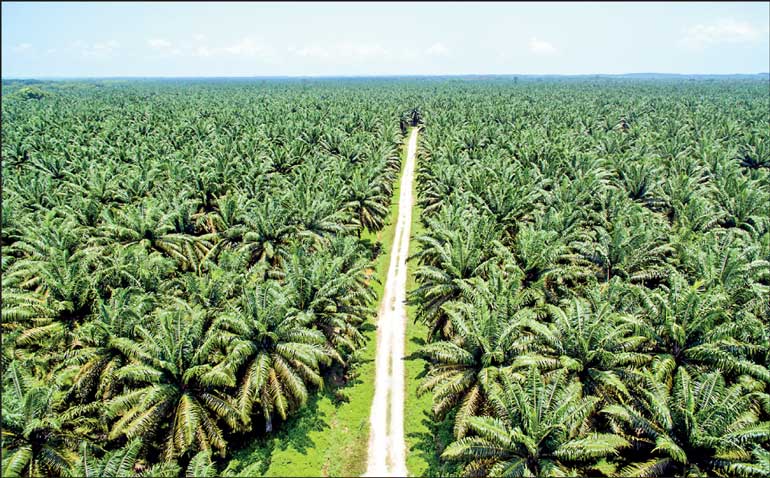Thursday Feb 26, 2026
Thursday Feb 26, 2026
Tuesday, 28 November 2023 00:02 - - {{hitsCtrl.values.hits}}

In the backdrop of Sri Lanka’s most severe economic crisis on record, the Planters’ Association of Ceylon (PA) called on the Government to take immediate steps to reverse the ban on oil palm.
On the contrary, the Association called for the development of a comprehensive policy framework for the sustainable expansion of oil palm cultivation - both for RPCs and smallholders.
Sri Lanka’s protracted economic crisis has plunged many of its citizens into financial despair with the national poverty rate increasing from 25% in 2022 to 28% in 2023, while in the rural sector this number has reached a staggering 32%.
Oil palm cultivation should expand to smallholder sector
According to PA Chairman, Senaka Alawattegama, the solution for the nation’s macroeconomic woes, and that faced by citizens in Sri Lanka’s rural heartland, is to be found in the opening up of sustainable oil palm cultivation to the smallholder sector. In particular, he emphasised the need to expand oil palm opportunities to rubber smallholders in marginal lands that have been decimated by adverse weather conditions and disease outbreaks.
“We are calling on the Government to not only reverse the ban, but also publicly acknowledge the value of this crop, and actively partner with RPCs in educating the public, and smallholders on its potential to ease their economic hardships. Today, an RPC employee working in an oil palm estate earns a wage above Rs. 100,000. We cannot deny our rural communities such an opportunity. The question is not if we should move ahead, but how. This call is not just for the transformation of the oil palm sector but for the sustainable revitalisation of rural economies across the nation,” he said.
Alawattegama called on the Government to explore a strategic policy framework for the sustainable expansion of oil palm into the smallholder sector. He urged the Government to take positive steps to reverse the Gazette, which set a ban on any new cultivation and forced RPCs to uproot 10% of their oil palm extents on an annual basis.
According to the AEN Oil Mills CEO Ruwan Goonewardene - the island’s sole commercial-scale producer of crude palm oil, smallholders across Kalutara and Kegalle are eager to plant oil palm and commence supplying AEN, but for the Government ban.
Allegations against oil palm scientifically proven false
«All allegations against oil palm have been scientifically proven to be false. But even with the science having been established beyond any reasonable doubt, there is still resistance to this crop. This resistance has nothing to do with environmental protection whatsoever. The resistance is almost entirely due to the fact that unlike tea and rubber, oil palm was never opened up and shared with smallholders. This has been the root cause of the entire campaign against this immensely valuable crop.
“We have discussed these matters at great length with members of the surrounding communities, including smallholders, the community and religious leaders. They too see the quality of life enjoyed by those engaged in oil palm industry. Their resentment is for not being included. If they are given a fair chance to participate in the benefits of this crop, they are ready to start cultivation even tomorrow,” Goonewardene said.
At present, Sri Lanka consumes 264,000 metric tons of palm oil, as per research by the Institute of Policy Studies (IPS) Sri Lanka, finding that the country currently saves approximately $ 17 million annually in foreign exchange outflows through domestic oil palm.
Meanwhile, nearly 74% of Sri Lanka’s total edible oil demand is met through costly imports. Local palm oil supplies a meagre 6% of this demand, with the rest through local coconut oil, which varies with the annual coconut production. While coconut oil is often considered a substitute, the current coconut production capacity is inadequate to meet the demand as a substitute for oil palm.
Given the limited land availability for expanding commercial cultivation in Sri Lanka, oil palm would help to bridge the country’s edible oil gap. Crucially, domestic oil palm production also provides employment for over 33,000 individuals and attracts a capital investment of Rs. 23 billion.
“Sri Lanka’s economic crisis has forced us into a position where we can no longer afford to ignore systemic issues. The most glaring of these issues is the fact that as a nation, we import more than we export. Palm oil is a substance used in a wide range of products, from food to shampoos and even medicines. It is economically unviable to switch completely to another plant oil.
“Moreover, even though oil palm is a relatively fast-growing crop, it still takes 3-4 years to import seedlings, establish new plant nurseries, and grow these crops to maturity. It takes about a decade to reach its full productivity. These processes can only take place during specific periods of time in the year, meaning every delay in planting deprives the Sri Lankan economy and its citizens of a simple and lucrative solution to the challenges we face. The Government must focus attention on removing the ban on an urgent basis,” Alawattegama said.